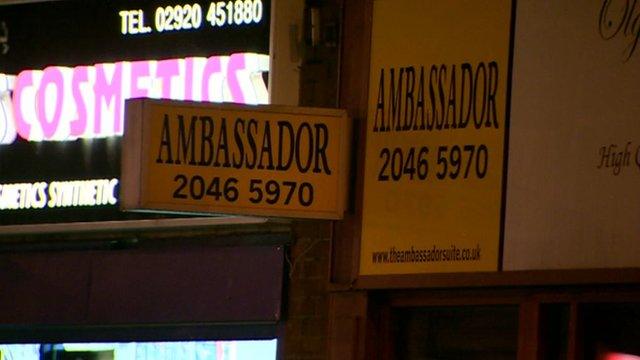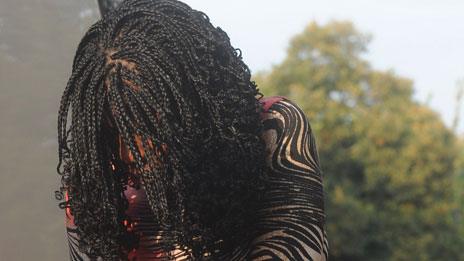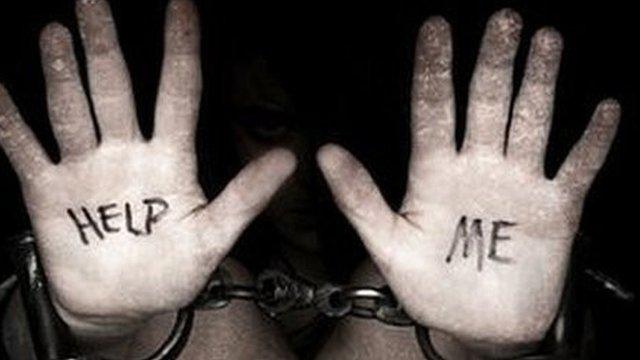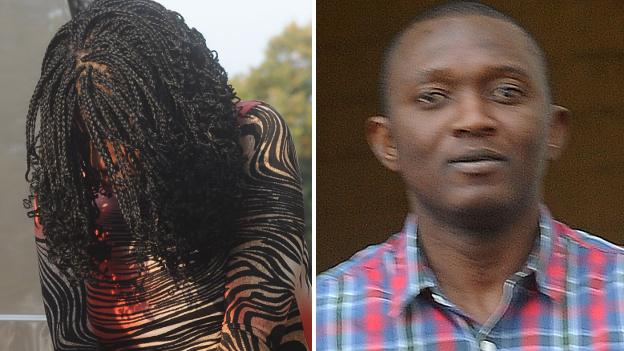Lizzy Idahosa guilty of 'juju' sex trafficking at Cardiff Crown Court
- Published

Lizzy Idahosa and partner Jackson Omoruyi denied any wrongdoing
A woman has been found guilty of trafficking two women from Nigeria to the UK to work in the sex trade.
Lizzy Idahosa, 24, arranged for the women to be put through a ritualistic "juju" ceremony in Nigeria to make them afraid of disobeying her.
Her partner Jackson Omoruyi was found guilty of money laundering offences.
Sentencing was adjourned but Judge Tom Crowther QC warned the defendants they should expect custodial sentences of some length.
Siddharth Kara on how juju is used to control people
Idahosa was found guilty of trafficking women to and around the UK, along with inciting prostitution and money laundering.
She is heavily pregnant with Omoruyi's baby, and already has a young child with him.
During the trial, the jury heard the women worked in brothels to repay Idahosa £50,000 for travel from Nigeria and false documents.
The victims, who cannot be named for legal reasons, said the juju ritual - sometimes known as voodoo or magic - left them fearing illness, madness, infertility and death.
They had sex with up to seven or eight men a day and were moved around a number of brothels in Croydon, Stevenage, Brighton, Swansea and Cardiff.
'Controlled and frightened'
Home Office officials and police eventually found one of the women working at a brothel in Cardiff in June 2013, and they quickly discovered she was a victim of trafficking. The other woman was later persuaded to talk about her experiences.
Nick Jupp, head of criminal investigation for the Home Office in Wales said the case was significant
Investigators said it was the first time they had been involved in a case where juju had been used to control victims - although they had previously heard about it happening.
Steve Chapman, the anti-slavery coordinator for the Welsh government said the case had been a serious one.
"These poor unfortunate women were vulnerable and were led to believe through juju their lives were controlled and they were frightened because something could happen to them," said Mr Chapman.
"People may see them out in public but they're being controlled. But using witchcraft is a very powerful means of controlling a person."
Nicola Rees, senior crown prosecutor for the Crown Prosecution Service Wales Complex Casework Unit, said the crime was "despicable and callous".
"These two defendants were involved in an elaborate deception, taking advantage of cultural and financial issues in order to gain a devastating hold over their vulnerable victims. Once the victims had entered the UK, they were exploited and abused in the most brutal manner," she added.
"It took an immense amount of courage for the victims to come forward and seek to break free from their ordeal."
Steve Chapman, the anti-slavery coordinator for the Welsh government, said there were other cases
- Published14 October 2014

- Published7 October 2014

- Published14 October 2014

- Published14 October 2014

- Published6 October 2014

- Published23 September 2014
